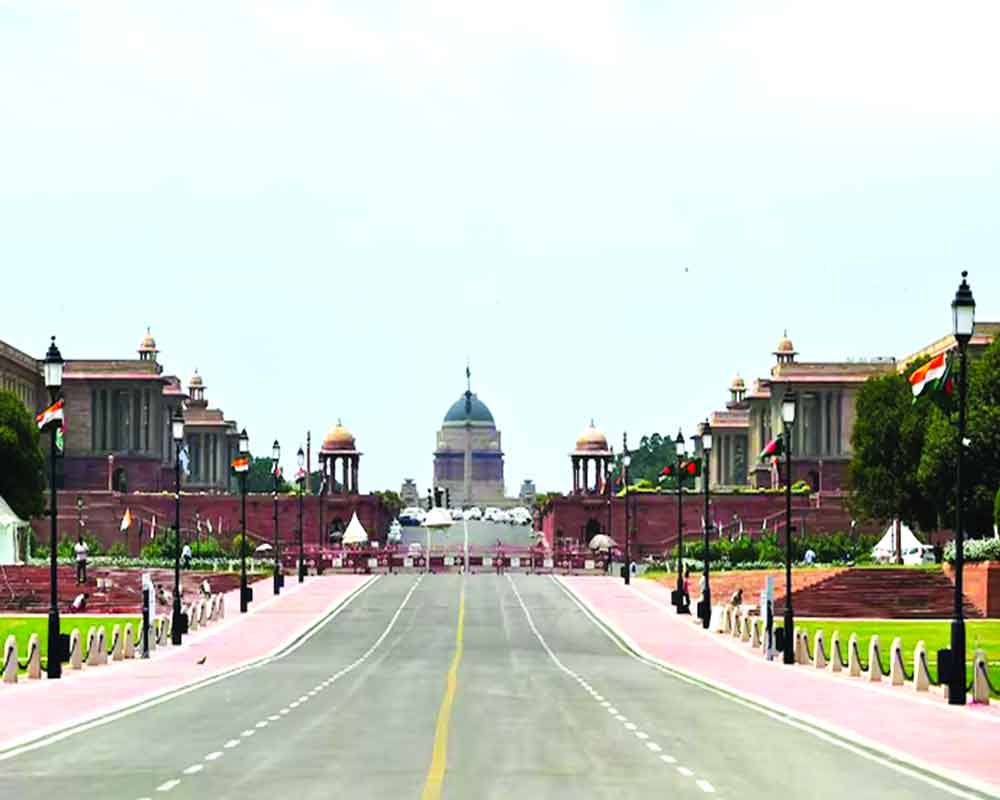A sort of history will be created when the national Capital votes in the Lok Sabha elections on Friday. Firstly, the voting will occur while the Delhi Chief Minister is out on interim bail after serving 50 days in judicial custody and is set to return to Tihar Jail on June 2. Secondly, it will be for the first time that Congress and AAP have united to challenge BJP’s dominance in Delhi. In the last two Lok Sabha elections — 2014 and 2019 — the BJP retained all seven seats in Delhi.
So far there used to be a direct fight between the Congress and BJP with Aam Admi Party (AAP) being the third entrant but the 2024 general elections will give chance to the electorates to vote for BJP candidates or combined candidates of Congress and AAP.
Interestingly AAP had dislodged the 15 years of Congress Government-led by late Sheila Dikshit on charges of corruption and the incumbent Kejriwal-led AAP Government is facing charges in multi-crore liquor scam. Since 2013, AAP has replaced Congress as a major political force in Delhi.
A total of 1.52 crore voters, including 82 lakh male and 69 lakh female voters as well as 1,228 third gender, are eligible to cast their votes at more than 13,000 polling booths in 2,627 places across the seven seats.
The weather department has sounded a yellow alert on the polling day with maximum temperature expected around 44 degrees Celsius.
The national Capital is always a battle of prestige and not numbers. Delhi has only seven parliamentary constituencies but it has high stakes. Interestingly, despite winning all seats in two consecutive parliamentary elections in 2014 and 2019, the BJP has not been able to snatch Delhi from AAP in the Assembly polls.
In late February, Congress and AAP reached a seat-sharing agreement after weeks of negotiations. Under this agreement, AAP will contest in four constituencies: East Delhi, West Delhi, South Delhi, and New Delhi. Congress will field candidates in the remaining three constituencies: Chandni Chowk, North East Delhi, and North West Delhi.
The electoral battle in Delhi had its fair share of twists and turns with the BJP dropping its six out of seven sitting MPs replacing them with freshers and the INDIA constituents entering into a seat-sharing agreement.
The AAP faced a major jolt with its national convener and Delhi Chief Minister Arvind Kejriwal being arrested by the Enforcement Directorate (ED) in a money laundering case, hardly a week after announcement of the polls, on March 21.
After 50 days, Kejriwal was granted an interim bail by the Supreme Court to campaign. He came out of Tihar on May 10 energising his party cadre and supporters with a whirlwind tour of the city in the road shows and public meetings in favour of not only the AAP candidates but also its ally, the Congress.
The Congress also faced a revolt. Arvinder Singh Lovely resigned as Congress chief protesting the party’s move to name former JNU Students’ Union president Kanhaiya Kumar from North East Delhi and ‘outsider’ Udit Raj from North West Delhi.
BJP is banking on Prime Minister Narendra Modi’s charisma and works done by the Modi Government including national security. It has also focused on corruption charges against Kejriwal and minority appeasement issues while both AAP and the Congress have focused on dictatorship of Modi and misuse of ED, CBI against Opposition leaders. The entire election in Delhi is focused between two personalities- Modi vs Kejriwal.
AAP has fielded Kuldeep Kumar from East Delhi seat, Mahabal Mishra from West Delhi, Somnath Bharti from New Delhi and Sahi Ram Pahalwan from South Delhi. The Congress has fielded JP Agarwal from Chandni Chowk, Kanhaiya Kumar from North East Delhi and Udit Raj from North West Delhi constituency.
BJP candidates include Manoj Tiwari from North East Delhi, the only sitting MP from Delhi fielded by the party again; Ramvir Singh Bidhuri from South Delhi, Bansuri Swaraj from New Delhi, Harsh Deep Malhotra from East Delhi, Yogendra Chandolia from North West Delhi, Praveen Khandelwal from Chandni Chowk and Kamaljeet Sehrawat from West Delhi. The BJP has fielded two women candidates in the national Capital.
Campaigners included Modi, BJP chief JP Nadda, Union Ministers Amit Shah, Rajnath Singh, Nitin Gadkari, Piyush Goyal among others; Chief Ministers of BJP ruled States including Yogi Adityanath of UP, Himanta Biswa Sarma of Assam, Pushkar Singh Dhami of Uttarakhand, Pramod Sawant of Goa and Maharashtra Deputy Chief Minister Devendra Fadanavis among others.
Congress leader Rahul Gandhi held three public meetings for the party candidates. Besides, Kejriwal and his wife Sunita Kejriwal, Punjab Chief Minister Bhagwant Mann and Delhi government ministers Atishi, Saurabh Bharadwaj, Gopal Rai, Kailash Gahlot also campaigned for the AAP candidates.
Several dignitaries and eminent personalities, including President of India Droupadi Murmu, Congress leaders Sonia Gandhi and Rahul, Kejriwal and Union Minister Hardeep Singh Puri are also voters of the city.
With 13,637 and four auxiliary -- including 2,891 critical -- polling stations in Delhi, 70 pink booths will also be set up, which will be handled by women officials only. Along with this, 70 model polling booths have been set up. The maximum number of voters is in the West Delhi seat at 25.87 lakh followed by West Delhi seat (25.67 lakh), North East Delhi seat (24.63 lakh), South Delhi seat (22.91 lakh), East Delhi seat (21.20 lakh), Chandni Chowk seat (16.45 lakh) and New Delhi seat (15.25 lakh).


























